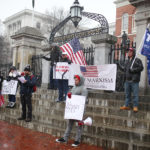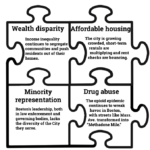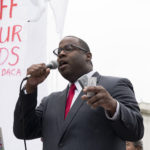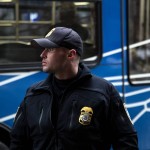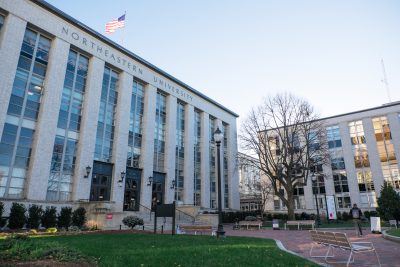
Northeastern University food service staff participated in a one-day strike on Friday in order to attend rallies that protest President Donald Trump’s inauguration, according to a press release from Boston’s Local 26, a union representing hospitality workers.
The strike, which began at noon on Friday and lasted until the morning shift on Saturday, gave the workers enough time to join students on marches to several protest locations throughout the day, including the Boston Common, according to the release.
The strike was not affiliated with Northeastern, according to a statement from the university.
“Dining services workers are valued members of the Northeastern community, but they are not employed by the university; they are employed by Chartwells, our food services vendor,” a Northeastern spokesperson wrote in an email to The Daily Free Press. “It’s also important to understand that the walk-out on Friday was related to national political events and not related to the university or its administration.”
Because of the close collaboration that exists between Chartwells and the university community, students were not negatively impacted by the strike, according to the statement.
Daniel Aldrich, a professor of political science at Northeastern, said walk-outs such as the one on Friday are often controversial due to the conflict of interest between the employers and employees.
“Obviously employers would prefer their workers stay on the job, but often times we have critical issues that don’t conform to a … schedule,” Aldrich said. “A lot of people that I know, blue collar workers for example, are not working nine to five jobs, and it’s very hard for them to get off. Those might be the only times they can participate, so it’s a challenge.”
Aldrich said he believes protests such as these play an essential role in getting people involved in discussions about political and social issues.
“In any democracy, you need citizens who are active and engaged, and many of them don’t feel motivated to go vote, or to write letters or to even go to public meetings,” Aldrich said. “But when you have a large-scale demonstration, and you have a march, these kinds of public events really can draw people who otherwise wouldn’t participate.”
Aldrich said he hopes people’s involvement in the social issues they care about will not end after these demonstrations. Instead, he would like to see people getting involved in politics beyond attending inauguration protests.
“Everyone has the responsibility to make democracy work,” Aldrich said. “You protest, but you also show up to vote, you also get involved in zoning meetings, you get involved in PTA board meetings, you get involved in local discussions on policy. That would be a much more ideal outcome than just having one event, once a year.”
Several Boston residents showed support for such demonstrations.
Sarah Odeh, 21, of Dorchester, said the inauguration protests were a better alternative to the violent means that are sometimes seen in political rallies.
“It’s a peaceful protest,” Odeh said. “They could be looting and doing violent things, but it’s the most peaceful way they can express their opinions and how they feel about it.”
Olivia Harvey, 21, of Roxbury, said it is important to be respectful in protest, but people should not be afraid to make their voices heard.
“I totally understand why people are marching, why people are protesting, because they want their voices heard, so I think that’s very important,” Harvey said. “If you feel like you weren’t represented in this election, or in any other facet of politics, I think it’s good to say ‘we want to be represented or respected.’”
Phil Woodburn, 33, of Fenway, defended the rallies and protests as a fundamental right of freedom of expression.
“It’s our right to have free speech and have the ability to protest,” Woodburn said. “It’s part of the democratic process.”

